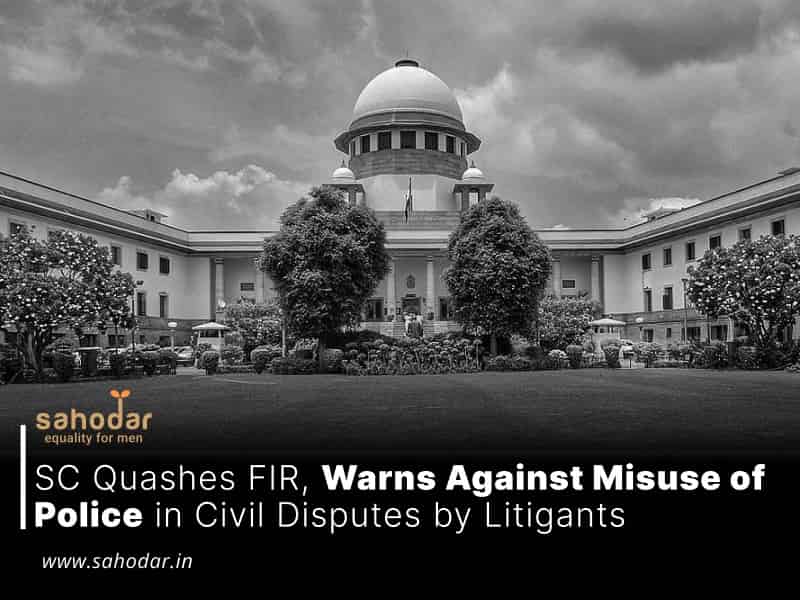The appeals before the Supreme Court were filed by the appellants arraigned as accused in a criminal case registered under Sections 406, 420, 467, 468, 471 and 34 of the Indian Penal Code, 1860.
The Supreme Court has Quashes FIR in a case where the main issue was the complainant asking for the remaining payment for work done under a contract. The Court strongly criticized how some people try to turn civil disputes into criminal cases by misusing the police system.
The people who appealed to the Court were accused in a criminal case filed under Sections 406, 420, 467, 468, 471, and 34 of the Indian Penal Code.
The Division Bench of Justice Vikram Nath and Justice Sandeep Mehta said, “This Court has time and again come down heavily on the attempts of the over-zealous litigants in trying to settle their civil disputes by misusing the police machinery and resorting to criminal proceedings. A gainful reference in this regard may be made to a decision of three-judge bench of this Court in Inder Mohan Goswami v. State of Uttaranchal, which involved a contractual dispute among the parties wherein a part payment had been made to the complainant by the accused. This Court, while exercising jurisdiction under Article 136 of the Constitution of India, quashed the FIR/criminal proceedings.”
Factual Background
The complainant stated that he is a professional contractor engaged in various construction projects. In 2009–2010, MIDC, Walunj, Aurangabad issued a tender for building a sewerage water treatment plant on a Build-Operate-Transfer (B.O.T.) basis. SWD Infra, the main contractor, gave a sub-contract to the complainant’s company, Sai Group, through a formal agreement. According to the complainant, the payment for this sub-contract work was to be made directly to him, based on instructions given by the Directors of BUL (who are the appellants in the case) to SWD Infra.
The complainant demanded the pending payment for the work completed. After receiving assurances of payment, he resumed the work and sent the bills by email to BUL’s Project Manager (Accused No. 3). Relying on these false assurances, the complainant ended up selling his assets to cover material and labour costs. He alleged that the accused had cheated him of a total amount of ₹5,11,69,398. Based on this, the disputed FIR was registered. Both the plea to quash the FIR and the related criminal petition were dismissed. Aggrieved by this, the accused approached the Supreme Court.
Reasoning
The Bench noted that the High Court had found a suspicious pattern in how the appellants’ company worked. They would get contracts from government departments and collect advance payments, claiming it was for project investment. Then, using the project papers, they would take large loans from banks and financial institutions. On this issue, the Bench observed, “The conclusions of the High Court are prima facie based on sheer conjectures regarding the appellants having misused the acquired work orders for taking loan from various financial institutions as well as taking advances from the MIDC.”
The Court referred to the report filed under Section 173(2) of the CrPC by the respondent-State, which painted a completely different picture. This report made no mention of the accused appellants misusing the awarded contracts or tenders to gain any unfair advantage from financial institutions like banks or even from MIDC. While the report did acknowledge the directions given by the High Court, it also highlighted that despite nearly ten years of investigation, the police failed to gather any evidence to support the High Court’s findings of financial misconduct by the appellants—apart from the disputed transaction involving the complainant.
“Apparently thus, the admitted facts as available on record reveal that the complainant’s claim is for reimbursement of the remaining amount claimed by him towards the works executed in furtherance of a contract. The allegations, made in the complaint, present a dispute which is purely commercial and civil in nature. It seems that the complainant has contrived to somehow or the other, involve the police machinery to act as recovery agents on his behalf. The complaint, on the face of record, did not disclose any offence whatsoever and no FIR should have been registered based thereupon”, it added. The Bench also found that ex facie, the allegations of forging the signatures of the Engineers, employed by the complainant, were not substantiated from the investigation conducted in the case.
“In wake of the above discussion, we are of the firm view that allowing the proceedings of the impugned-FIR and the chargesheet filed as a culmination of the investigation, would be nothing short of a gross abuse of process of the Court”, it said while allowing the appeal and quashing the FIR.

